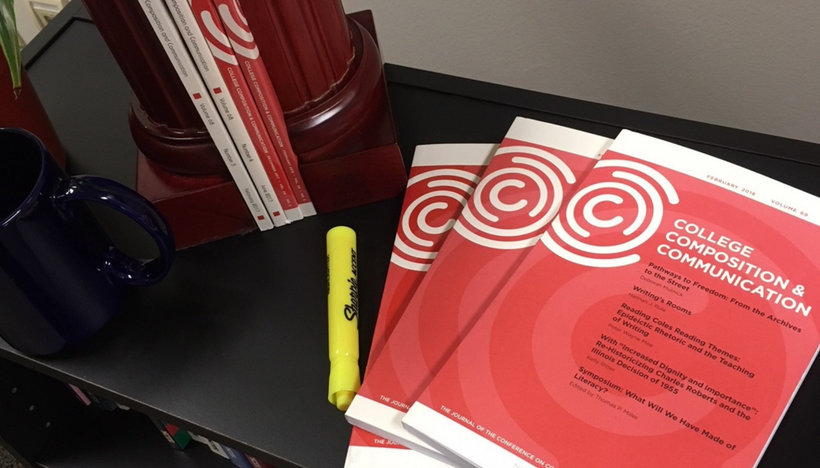This post is written by member Jens Lloyd, editorial assistant for College Composition and Communication.
College Composition and Communication publishes scholarship in rhetoric and composition studies that supports college teachers in reflecting on and improving their practices in teaching writing. Our February 2018 issue, available online and in print, contains articles that delve into community-engaged writing pedagogy, spatially vibrant research methodologies, and complicated disciplinary histories.
Deborah Mutnick reflects on co-organizing a research-intensive learning community that prompted students to inquire into the historical and political layers of their immediate surroundings. The description of this pedagogical initiative will be particularly relevant to teacher-scholars eager to respond to what Mutnick describes as “the neoliberal evisceration of higher education that, at its worst, renders such transformative learning impossible.” Hannah J. Rule is also interested in the connections between writers and their surroundings, though she takes a much more intimate focus by studying the embodied practices of individual writers. Arguing that “[writing] processes are susceptible to environmental forces and never in writers’ full and autonomous control,” Rule shows how innovative research methods can enrich our perceptions of the materiality of composing.
The next two articles, which showcase the field’s continued interest in exploring its own history, look at two figures from the latter half of the twentieth century. Peter Wayne Moe reconsiders the pedagogy of William E. Coles Jr., a figure whose copious output has been largely dismissed or neglected. Offering a constructive analysis of how Coles invites students to critique the implicit values of academic writing, Moe argues that epideictic rhetoric can play a more central role in writing instruction. Kelly Ritter presents a rich archival study of the Illinois Decision, a move spearheaded by Charles Roberts in 1955 to eliminate basic writing instruction at the University of Illinois. Ritter makes a compelling case for why this decision resonates today, especially as writing program administrators grapple with weighty issues like “the public’s perception of basic writing or productive K–16 partnerships.”
Finally, our February issue concludes with a lively symposium on literacy: the assumptions we make about it, the methodologies we use to study it, and the intersections between literacy and race, class, and sexuality. Organized by Thomas P. Miller, with contributions from Deborah Brandt, Kate Vieira, Carmen Kynard, and CCC editor Jonathan Alexander, the symposium accounts for the paths we have charted as literacy scholars and also outlines new paths for us to explore.
In the coming weeks, all of our February authors will be featured in our podcast series. Check out these interviews for additional insights into the scholarship published in CCC. We welcome feedback and questions about the journal (and our podcasts series!) at ccceditors@gmail.com.
Jens Lloyd is a PhD candidate at UC Irvine.

